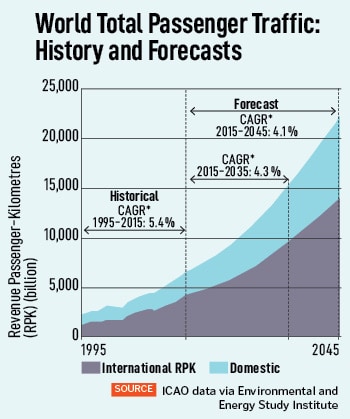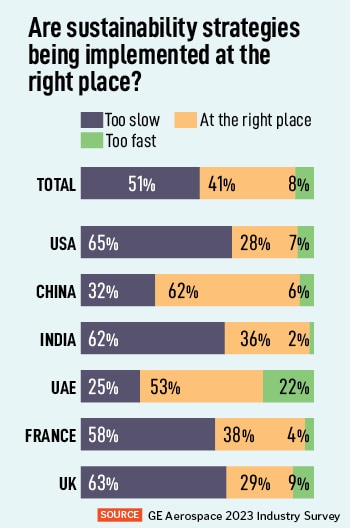As Paris Air Show returns, sustainability is aviation's biggest challenge
Nearly two-thirds of respondents in the US, UK and India, in a GE Aerospace survey, say the pace of implementation of decarbonisation strategies is "too slow"


The Paris Air Show returns today after a four-year hiatus, marking the aviation industry’s return to growth since the Covid pandemic. And a recent survey from one of the industry’s biggest players, GE Aerospace—the aviation arm of General Electric—shows that many people, including in India, expect the industry to miss its target to go net-zero by 2050.
Only 30 percent of respondents in the survey believe that meeting sustainability goals outweighs concerns about supply chain and labour issues. However, 51 percent of those surveyed are unhappy with the pace of progress in implementing sustainability strategies.
Asked if they thought that sustainability strategies in the industry were being implemented at the right pace, they chose “too slow" as their response. The other two choices were “at the right pace" and “too fast."
“The aviation industry is focused on the goal of achieving net zero CO2 emissions by 2050, while also recognising the need to accelerate efforts," Allen Paxson, vice president and general manager of commercial programs strategy at GE Aerospace, said in a report that pulled together the results of the study.
The survey was commissioned by GE’s aviation business. In November 2021, GE announced a plan to split itself into three standalone businesses around health care, power and energy, and aviation and aerospace. In January this year, GE announced the completion of the separation of the health care business.
The spinoff of the power and energy business, to be called GE Vernova, is expected to conclude next year, leaving GE as an aviation focused company – GE Aerospace.
The study was conducted by Ipsos, a well-known global market research and consulting company, from May 2 to May 11, involving 325 aviation industry decision makers from the US (57 respondents), UK (56), China (50), India (55), the UAE (55), and France (52). It sought views on the industry’s progress on sustainability challenges, goals, and strategies.
While that 51 percent represents all the respondents – including China (32 percent said too slow) and UAE (25 percent), the two cohorts with the least number of respondents being worried about the pace – much bigger proportions of decision makers in other individual markets are dissatisfied with the state of progress.
In the US, 65 percent said the rate of implementation of sustainability strategies was “too slow." In Britain, it is 63 percent, and 62 percent in India.
The survey indicated that the aviation industry agrees that sustainability is one of its biggest challenges. Two-thirds (67 percent) of respondents agreed that the industry is focused on sustainability, and more than 75 percent acknowledged that sustainability has “fundamentally transformed" the industry"s operations.
 The findings also show that companies are backing their commitments with investments. Nearly 90 percent of respondents confirmed having a sustainability strategy in place, with more than 70 percent reporting a significant or moderate impact on their investment and operational decisions.
The findings also show that companies are backing their commitments with investments. Nearly 90 percent of respondents confirmed having a sustainability strategy in place, with more than 70 percent reporting a significant or moderate impact on their investment and operational decisions.
And, despite concerns over inflation or recession, most of these companies plan to maintain or increase sustainability-related investments.
While data can be interpreted in various ways, one scientific research effort, widely seen as a credible study of the impact of aviation on global warming is one titled ‘The contribution of global aviation to anthropogenic climate forcing for 2000 to 2018,’ by a group of renowned scientists, published in the journal Atmospheric Environment.
According to their research, the aviation industry accounted for an estimated 3.5 percent of the net anthropogenic (human-made) impact, based on the study of a phenomenon called radiative forcing (a measure of how much energy is hitting the earth, from the sun mostly, and how much is leaving – greenhouse gases trap the energy and prevent it from leaving).
In October 2021, members of the Air Transport Action Group (ATAG), an industry lobby including GE Aerospace, adopted a long-term climate goal of net zero carbon emissions by 2050.
In the GE-Ipsos survey, 46 percent believe this will be possible, 32 percent say the industry will miss that target, and 22 percent are unsure. The average expectation is that the target will be met by 2055.
Respondents identified rising costs, funding constraints, supply issues, and energy resources as the primary hurdles. They also emphasised the importance of advancements in fuels and engines to achieve the industry"s 2050 goal.
Newer “engines such as GE9X and the Passport 20 today are 10-15 percent more fuel efficient than the previous generation of engines" such as the GE90 or the CF34, Mohamed Ali, GE Aerospace’s VP of engineering told Forbes India in a recent interview.
 The company and its commercial partners, including Safran Aircraft Engines in France, and science and tech collaborators including NASA, the US space agency, are developing hydrogen as well as hybrid-electric engines. These are, however, a decade or more away from becoming commercial products.
The company and its commercial partners, including Safran Aircraft Engines in France, and science and tech collaborators including NASA, the US space agency, are developing hydrogen as well as hybrid-electric engines. These are, however, a decade or more away from becoming commercial products.
In parallel, sustainable aviation fuels (SAF) is another area of research and development. Also called bio jet fuels, these are made from renewable sources such as plant-based oils as well as, in the case of some synthetic fuels, from various chemicals and CO2 captured in industrial processes – using renewable power.
In all of this, money, is the bottom line. According to the results of the survey, a majority of the respondents want more public money to be spent on accelerating the private industry’s progress towards sustainability.
Of all the respondents, 29 percent identified governments as the external entities applying the most pressure to accelerate sustainability, followed by investors at 17 percent. And 61 percent prefer incentives and policy support over mandates and regulations.
Respondents said that increased investment in sustainable aviation fuel should be governments’ top priority in facilitating the industry"s achievement of the 2050 goal.
First Published: Jun 19, 2023, 13:13
Subscribe Now